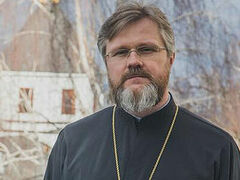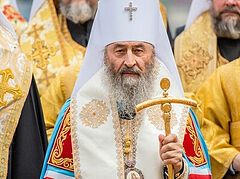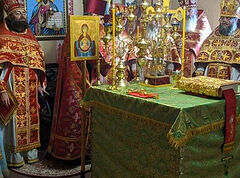Metropolitan Luke (Kovalenko) of Zaporozhye and Melitopol is one of the most charismatic bishops of the Ukrainian Orthodox Church (the UOC-MP) and a firm defender of the truth. Born in the Donetsk region, a medic by profession, His Eminence was tonsured with the name Luke in honor of St. Luke (Voino-Yasenetsky) of Simferopol. The situation in Ukraine more than once gave Vladyka the opportunity to show courage: he had to face a raging crowd of nationalists face to face.
We have talked with Metropolitan Luke about where to find the courage to act according to conscience, how to preach in the current environment and what acute problems the diocese and the Church are especially faced with.
 Metropolitan Luke (Kovalenko) of Zaporozhye and Melitopol
Metropolitan Luke (Kovalenko) of Zaporozhye and Melitopol
—Ten years ago, you became the ruling hierarch of the Diocese of Zaporozhye. What has been most difficult in administering the diocese over these years? What problems still remain unresolved?
—The difficulties in administering the diocese are connected with people. This is the most valuable yet the most difficult thing we have. What is the problem here? Someone compared human personalities with stones from a river. They lie on the bank, all smooth and even and without any imperfections, and it is pleasant to take them into your hand—but they don’t match each other. This is where the problem arises for us: how to make us not so rough, respect each other and find understanding?
What I have observed applies not only to the Diocese of Zaporozhye. It is the shapelessness, laziness, envy and other negative traits that we have to face even in our Church environment. Then what can we say about the outside world? What weaknesses then do non-Church people suffer from?
If we analyze the changes in human relations in modern Ukrainian society, we will find that the level of aggression and anger has become very high. This situation is influenced by the media. For instance: A man comes home from work and he needs to eat and rest. He turns on TV and watches a serial. After that he watches the latest news, with all the anger, hatred and constant problems shown there. This is followed by a talk show in which politicians insult each other, foaming at the mouth. Every day, millions of our citizens are brainwashed with information in this way, and as a result the situation in families is aggravated; the person flares up at those around him, whether at home or at work.
I constantly ask myself the questions: What has not been done yet and what else can be done? And here arises another problem that I would like to voice: the sheer waste of time—a disaster that concerns clergy and laity alike. We do not take the trouble to help those close to us or occupy our time with as much benefit to our souls as possible. I have to deal with this all the time, and I often don’t know how to solve this issue in the right way for myself.
—How does a medical education help you in your pastoral ministry?
—A medical education, like any university education, gives you systematic knowledge. But to me, something else is important. This profession allows me to see the universality of processes that occur both in inanimate and in animate nature—especially between people.
We say that the Church is a living organism, implying that we can compare the processes taking place in the body with those in interpersonal relationships. And, most importantly, this universality of the laws of inanimate and animate nature is proof of the existence of God for me. Because no theory of Evolution, no Big Bang theory can explain this universality.
Medical knowledge is of paramount importance in pastoral work as well. Our era has been dubbed the “age of biotechnology.” Now for example we are inundated with information about viruses and vaccines. But it is terrible that people who have nothing to do with medicine, much less vaccination, speak about this and propound theories. It is hard for an ordinary person to find something important in this junk information. For instance, although I have a medical education, I have no moral right to give recommendations regarding any treatment. I am not a medical practitioner and I can only suggest a specialist someone can see.
Therefore, I would like to address all of our pastors who, having no medical education, dare to give medical advice. Don’t do it lest you harm people! After all, it will remain an indelible burden on your conscience, especially if you don’t even have any awareness of what was done.
—To what extent does the current political reality in the country affect the life of the Ukrainian Orthodox Church and specifically of the Diocese of Zaporozhye?
—It is impossible to separate the people, the State and the Ukrainian Orthodox Church. We all make up one organism and we should clearly understand that whether one member suffer, all the members suffer with it (1 Cor. 12:26).
After all, priests are not bred in some kind of greenhouses and are not raised in closed boarding schools. We all live in the same society which surrounds us. But what is the calling of the Church? To bring people to Christ, point out shortcomings, give a spiritual assessment of the processes that take place in society, ad respond to what contradicts the teachings of the Gospel in it. As for the State, it is called to take care of its subjects. When political slogans are decorated with Gospel words, we get a surrogate in the form of the structure headed by Epiphany Dumenko, which is anything but the Church.
Modern politicians do not live the life of the Church—they do not check their actions with the teachings of Christ, but at the same time they try to dictate how the Church should live. It’s as if I came and started teaching how a hadron collider should be built! This is the problem. A person who has received some very slight power believes that he holds God by the beard and tries to teach the Church—an organism created by God which is more than 2,000 years old, and with which he has nothing to do.
We should clearly understand that the Church has been, is and will be. It is we who can be or cannot be in it. All depends on us. So the most important thing is not to lose the Church and always be with it.
—The Church has been able to preach and develop freely for over thirty years, but our society hasn’t become more moral because of this. Why is this?
—It is important for us to remember the words of the Lord: Fear not, little flock (Lk. 12:32), and When the Son of man cometh, shall He find faith on the earth? (Lk. 18:8). That is, He tells us that there will never be many people who follow Him because there is a constant struggle between good and evil, and the battlefield is the human heart, as Fyodor Dostoevsky once noted.
I think it would be wrong to say that our society has not changed because the Church preaches badly. Judging by the depth of the confessions of people who come to us, I can say that there are many seekers of salvation, that they exist and will continue to exist, and their number is not decreasing.
But we just stopped noticing them, or maybe they were unnoticed before. And the reason for this is not in the Church, but in what is happening in society. God loves man so much that He gives him free choice—to follow Him or to live as he wants. It is important for us not to get lost, not to adapt to this society, but to try and preserve the purity of Orthodoxy, of our faith.
—Our world is changing under our very eyes. Perhaps new forms of Christian mission should appear? How should modern people speak about Christ?
—We must understand that we should speak about Christ with people not while lying on a sofa but by our own example and our active faith. Recent events associated with the so-called pandemic are driving us into the virtual world. But biologically, man is a social being and he needs communication. And when we are offered a screen instead of it, it’s not normal.
We mistakenly think that mission is only the transmission of information about God and the Church. Yes, on the one hand it is so. But what did missionaries do? They did not just speak about Christ, but they also kindled the flame of faith in people’s hearts. That is, he who listens to a missionary should be well disposed to him. Is that possible through a computer or a smartphone? Perhaps in part, yes. But for us, true mission is real communication with each other.
We must prove our faith by deeds. Just as faith without works is dead, so is mission. If it is merely verbal transmission of information that is not supported in practice, it will lead to nothing.
—You are one of the few hierarchs to blog successfully on the net. Is online preaching of this kind effective, and how do you find time for this?
—I cannot judge the effectiveness of my Telegram channel and have no right to do so. It is known to God alone. Of course, there is a catastrophic lack of time for this, and not because I am so busy but because of the idleness I talked about earlier and sheer time-wasting. Observing my life, I see how much time is wasted.
My posts in the messenger are usually the sermons I deliver. Then I send them to person who is very close to me in soul, and he edits them and sends them back. I proofread the already printed text again and post it on the net. As for where I find the strength for this—the Lord strengthens me.
—By all appearances, peaceful times for Christians are drawing to an end. Where can we find the courage to act according to conscience and not to be afraid to tell the truth?
—In my opinion, the Church has never known peaceful times. I recall the words of St. John Chrysostom who said clearly that “the most terrible persecution for the Church is the absence of persecution.” We have always been “outsiders”. I remember how I was treated when I first started going to church. The same happens to anyone who strives to imitate Christ in his life. We will always differ from this world.
Moral persecutions of the Church have never ended because vice has always reigned in this world. We are weak, and we often don’t know how to act in one or another situation. Where can we get courage? Of course, first and foremost in the Church sacraments. Live with Christ, and He will surely help you. The podvig of the New Martyrs and Confessors convinces us of this. They were afraid of only one thing—of leaving Christ. And He gave them strength.
Visit a hospice, a nursing home, or a dying patient—see how these people fight their illness, how they are going through their suffering. I think we will reappraise many things and will find the strength and courage to tell the truth, to live and act according to conscience.
Therefore, it is important not to think about peaceful times. Where there is Christ it is always peaceful. This is the most important thing. With Christ no storms are dangerous to us. So I would like to wish readers to always be able to be with Christ and never leave Him. And I believe that with the help of God we will overcome all storms and passions.
I want to conclude with our Zaporozhye greeting used during Christmastide [when the interview was most probably conducted.—Trans.]: “God is with us! He is and ever shall be!”



